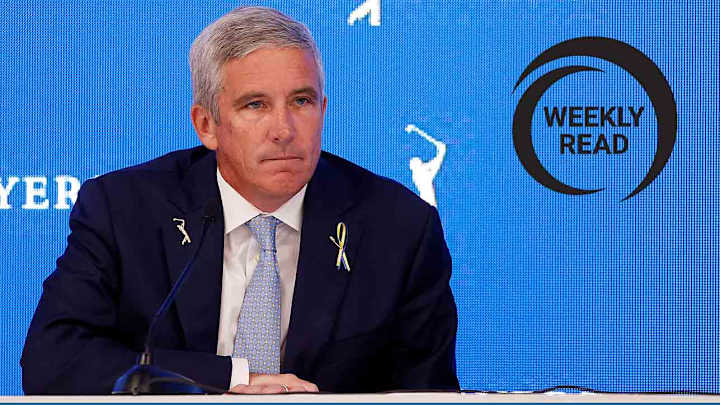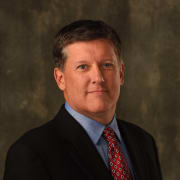In the Midst of Everything Else, the PGA Tour Takes a Stand Against a Golf Ball Rollback

The ultimate stance on the issue is not as surprising as the timing. The PGA Tour, despite support from Tiger Woods and Rory McIlroy, always seemed poised to express its opposition to the proposed Model Local Rule that would see a golf ball rollback for elite players.
It just seems odd that it would come now and buried in a lengthy memo that commissioner Jay Monahan sent to players last week in his first major communication since returning to work from an undisclosed health issue.
More Weekly Read: Phil Shows Harmony Won't Be Easy | LIV Golf Pushes Forward | Fore! Things
Monahan, who has faced criticism from a good number of players in the wake of the controversial, secret decision to enter into a "framework agreement" with the Public Investment Fund of Saudi Arabia and the DP World Tour, provided more details about the deal, including a "Player Benefit Program" for those who did not jump to the rival LIV Golf League as well as a task force that will be charged with figuring out how players who want to come back to the PGA Tour can do so.
Those topics are top of mind.
The ball issue, which still has a month-long comment period per the United States Golf Association and the R&A and would not even be enacted until 2026, is certainly of great importance overall to the game, but not as critical in this context.
But it seems Monahan used the opportunity to show the players—a majority of whom are against changes to the ball—that he has their back. And he’s doing so during a critical time when he needs to rally their support—not only to try and get the framework deal done, but also to regain their trust.
There is some urgency as a deal needs to be done by the end of the year, and how that plays out is a great mystery. LIV Golf continues to operate as-is with no plans of slowing down. The PGA Tour needs to figure out how to pay for a series of $20 million designated events next year that has seen some pushback from title sponsors.
And achieving peace in the game and moving forward are among many issues still be resolved.
The ball rollback decision would make bigger headlines at a different time. Essentially, the Tour is telling the governing bodies that it does not want to play by its rules. That is seismic when you consider how the PGA Tour has always operated—within the framework of USGA/R&A rules.
At various times, players have called for the Tour to administer its own rules, an argument that Tony Finau made last week at the 3M Championship.
"I would say the main thing is that the PGA Tour is taking a stand on the rollback of the golf ball," Finau said. "I think that that’s important, setting a precedent moving forward hopefully. My opinion has always been that we should have our own rulebook on the PGA Tour and we should abide by those. Seeing that they’re taking a stand when it comes to rolling the ball back, I thought that that was one of the main things I got from the memo."
Interestingly, Monahan—and his predecessor, Tim Finchem—have always pushed back against the Tour making its own rules. For example, here is Monahan at the 2019 Players Championship, a few months after an extensive overhaul of the golf rule book went into effect.
"We have two fantastic professional governing bodies of the game," he said. "We have always played by their rules and we will continue to play by their rules. And we are not going to be playing by our own rules."
To be clear, if the Model Local Rule goes into effect in 2026 and the Tour chooses not to adopt it, the Tour would not technically be "playing by (its) own rules." But clearly, the intent of the governing bodies is to have top players adhere to the MDL.
This is not like preferred lies—a local rule that can be enacted due to weather conditions—or even the "one-ball" rule, which is a local rule that the major tours employ (although the PGA of America does not require it).
No, this sets up the potential for at least three of the major championships—the Masters, U.S. Open and British Open—enacting the Model Local Rule for a ball that is tested under modified launch conditions. It basically means the ball will travel shorter distances for players with high swing speeds. And it means that you could see players having to adjust to a different ball from, say, the Memorial Tournament to the U.S. Open. That is far from ideal.
It is understandable why players are not in favor of the proposal. Nobody wants to see their drives go shorter. Equipment companies want to sell the same products to recreational players and there is fear that they’d be spending considerable sums on golf balls that are not a retail success.
Recreational players would not be impacted by the new rule, and there is already anecdotal evidence that suggests slow swing speeds would not even be impacted by the reduced ball. Recreational players would be free to choose.
That data on all of that needs to be revealed. And the issue of reining in equipment—including the size of driver heads—will continue to be a topic in the game. As Martin Slumbers, the CEO of the R&A said during the week of the Open, "doing nothing is not an option."
The PGA Tour has decided to push back on this particular aspect of it for now. That it is doing so in the midst of the stunning "framework agreement" is yet another step in what continues to be a remarkable, unpredictable journey.
